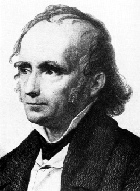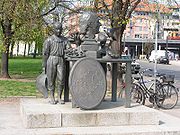
Adolph Diesterweg
Encyclopedia

Siegen
Siegen is a city in Germany, in the south Westphalian part of North Rhine-Westphalia.It is located in the district of Siegen-Wittgenstein in the Arnsberg region...
, died July 7, 1866 in Berlin
Berlin
Berlin is the capital city of Germany and is one of the 16 states of Germany. With a population of 3.45 million people, Berlin is Germany's largest city. It is the second most populous city proper and the seventh most populous urban area in the European Union...
) was a German
Germans
The Germans are a Germanic ethnic group native to Central Europe. The English term Germans has referred to the German-speaking population of the Holy Roman Empire since the Late Middle Ages....
educator and thinker who, also a progressive
Progressivism
Progressivism is an umbrella term for a political ideology advocating or favoring social, political, and economic reform or changes. Progressivism is often viewed by some conservatives, constitutionalists, and libertarians to be in opposition to conservative or reactionary ideologies.The...
liberal politician, campaigned for the secularization
Secularization
Secularization is the transformation of a society from close identification with religious values and institutions toward non-religious values and secular institutions...
of schools, and is said to be precursory to the reform of pedagogy
Pedagogy
Pedagogy is the study of being a teacher or the process of teaching. The term generally refers to strategies of instruction, or a style of instruction....
.
Biography
Educated at Herborn and Tübingen universities 1808-1811, he took to the profession of teaching in 1811. He taught at MannheimMannheim
Mannheim is a city in southwestern Germany. With about 315,000 inhabitants, Mannheim is the second-largest city in the Bundesland of Baden-Württemberg, following the capital city of Stuttgart....
and at Worms
Worms, Germany
Worms is a city in Rhineland-Palatinate, Germany, on the Rhine River. At the end of 2004, it had 85,829 inhabitants.Established by the Celts, who called it Borbetomagus, Worms today remains embattled with the cities Trier and Cologne over the title of "Oldest City in Germany." Worms is the only...
for about two years, and then moved to the model school at Frankfurt am Main. Later he became rector of the Latin school of Elberfeld
Elberfeld
Elberfeld is a municipal subdivision of the German city of Wuppertal; it was an independent town until 1929.-History:The first official mentioning of the geographic area on the banks of today's Wupper River as "elverfelde" was in a document of 1161...
. In 1820, he was appointed director of the new teacher's seminary at Mörs
Mors
Mors may refer to:*Mors , the personification of death in Roman mythology*Mors, Latin for death and is a feminine gender noun*Mors , a French car manufacturer from 1895-1925...
where he put in practice the methods of Pestalozzi
Johann Heinrich Pestalozzi
Johann Heinrich Pestalozzi was a Swiss pedagogue and educational reformer who exemplified Romanticism in his approach....
. In 1832, he was summoned to Berlin
Berlin
Berlin is the capital city of Germany and is one of the 16 states of Germany. With a population of 3.45 million people, Berlin is Germany's largest city. It is the second most populous city proper and the seventh most populous urban area in the European Union...
to direct the new state-schools seminary in that city. Here he proved himself a strong supporter of nonsectarian
Nonsectarian
Nonsectarian, in its most literal sense, refers to a lack of sectarianism. The term is also more narrowly used to describe secular private educational institutions or other organizations either not affiliated with or not restricted to a particular religious denomination though the organization...
religious teaching. In 1846, he established the Pestalozzi institution at Pankow
Pankow
Pankow is the third borough of Berlin. In Berlin's 2001 administrative reform it was merged with the former boroughs of Prenzlauer Berg and Weißensee; the resulting borough retained the name Pankow.- Overview :...
, and the Pestalozzi societies for the support of teachers’ widows and orphans. Because of his disagreement with the authorities regarding important phases of higher education he was in constant friction and resigned from the seminary in 1847. In 1850, he received a government pension. Thereafter, he continued to vigorously advocate his educational ideas, but solely through the medium of periodicals. In 1858, he was elected to the chamber of deputies as member for the city of Berlin, and voted with the Liberal opposition.
Philosophy
Diesterweg thought criticalnessCritical pedagogy
Critical pedagogy is a philosophy of education described by Henry Giroux as an "educational movement, guided by passion and principle, to help students develop consciousness of freedom, recognize authoritarian tendencies, and connect knowledge to power and the ability to take constructive...
and responsibility
Moral responsibility
Moral responsibility usually refers to the idea that a person has moral obligations in certain situations. Disobeying moral obligations, then, becomes grounds for justified punishment. Deciding what justifies punishment, if anything, is a principle concern of ethics.People who have moral...
were important in teaching, and sought to reform social
Social
The term social refers to a characteristic of living organisms...
, economic and moral aspects of education
Education
Education in its broadest, general sense is the means through which the aims and habits of a group of people lives on from one generation to the next. Generally, it occurs through any experience that has a formative effect on the way one thinks, feels, or acts...
publishing the influential Pädagogisch Wollen und Sollen. He based his program on what was named the "basic principles of the struggle for life" that he saw in the Catholicism
Catholicism
Catholicism is a broad term for the body of the Catholic faith, its theologies and doctrines, its liturgical, ethical, spiritual, and behavioral characteristics, as well as a religious people as a whole....
/Protestantism
Protestantism
Protestantism is one of the three major groupings within Christianity. It is a movement that began in Germany in the early 16th century as a reaction against medieval Roman Catholic doctrines and practices, especially in regards to salvation, justification, and ecclesiology.The doctrines of the...
conflict. He thought there were several 'oppositions' (distinct choices) that were available in the conflict which could be reduced to a single "authority or freedom, Catholicism or Protestantism".

Works
Diesterweg was a voluminous writer on educational subjects, and was the author of various school text-books. He authored 50 books and published about 400 papers; he has been credited with originated the phrase 'learn to do by doing' by one source.In 1851, he founded the Pädagogisches Jahrbuch (Yearbook of pedagogy) in Berlin. Among his publications were:
- Wegweiser zur Bildung für deutsche Lehrer (Guide for the instruction of German teachers; 2 vols., 1834; 6th ed., 1 vol., 1890)
- Das pädagogische Deutschland (German pedagogy; 1836)
- Streitfragen auf dem Gebiete der Pädagogik (Controversial questions in the field of pedagogy; 1837)
- Leitfaden für den Unterricht in der Formlehre (1845)
- Lehrbuch der mathematischen Geographie (1840; 18th ed., as Populäre Himmelskunde, 1891)
- Unterricht in der Kleinkinderschule (5th ed., 1852)

